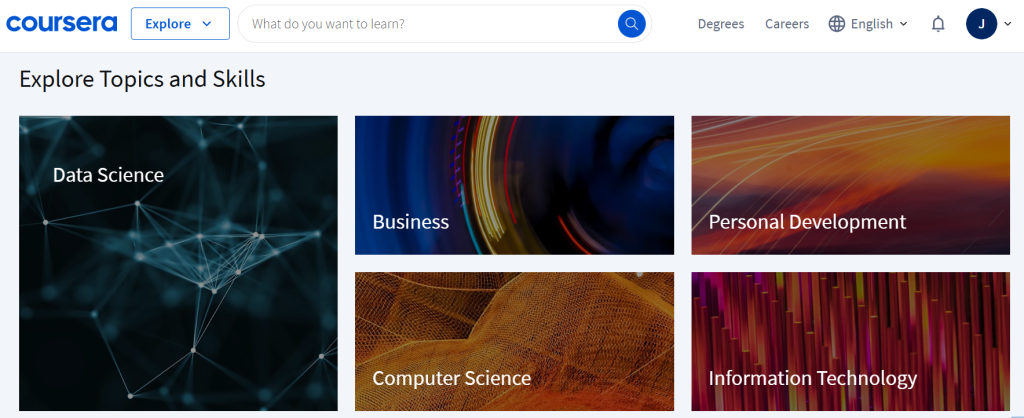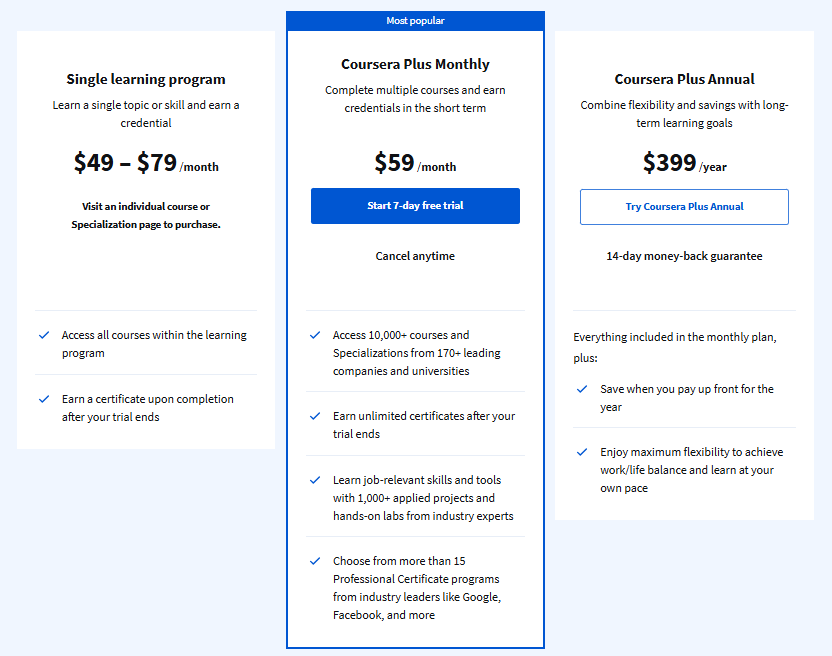Ready to boost your career and knowledge? 🚀
Coursera offers top-notch online courses from leading universities and companies 🎓, and in this review, we’re diving into everything you need to know. 🔍
From course variety to user experience, let’s explore whether Coursera is the right platform for you to enhance your skills and take your learning to the next level ✨

Imagine unlocking your potential with top-tier courses from experts in your field without breaking the bank! 💡
Whether you’re a beginner or looking to enhance your skills, Coursera offers a wide range of affordable and accredited ✅ courses that could take your career to the next level 📈
My Personal Experience With Coursera
A few months ago, I realized the need to level up my skills to stay competitive in my industry, so I turned to Coursera. I started with Python. This was followed by a course in Artificial Intelligence (AI), where I learned how to apply machine learning to improve decision-making and business strategies.
Next, I tackled Cybersecurity, recognizing the growing importance of protecting company data and systems. Coursera gave me practical insights.
Finally, I enrolled in a Business Analysis course to understand how to assess and solve business problems using data.
Coursera has been a game-changer, equipping me with the tools to drive efficiency and contribute meaningfully to my business, all while advancing my career.

What’s Unique About Coursera Courses?
Coursera is unique for offering accredited courses and degrees from top universities, providing flexible, self-paced learning with both free and paid options.
1. ChatGPT
- ChatGPT is an AI language model that understands and generates human-like text.
- It is used to build chatbots, virtual assistants, and content generation tools.
- Courses on Coursera explain how to integrate ChatGPT into applications for various industries.
- They cover topics such as API integration, prompt engineering, and natural language understanding.

2. Coding
- Coding is the process of writing instructions that computers can understand.
- It involves using programming languages to create software and applications.
- Coursera courses introduce beginners to basic programming concepts.
- Topics include writing syntax, debugging code, and developing simple applications in different languages.
3. Computer Science
- Computer Science covers the study of algorithms, data structures, and software engineering.
- It involves learning both theoretical concepts and practical applications.
- Courses on Coursera are often provided by leading universities and cover topics like algorithms and computation theory.
- They help build a strong foundation in problem-solving and programming.

4. Cybersecurity
- Cybersecurity is the practice of protecting computer systems and networks from attacks.
- It involves understanding how digital security works and learning how to safeguard data.
- Coursera offers courses ranging from basic security principles to advanced topics like network security and ethical hacking.
- Courses also teach practical methods to prevent, detect, and respond to cyber threats.
5. DevOps
- DevOps is a set of practices that brings together software development and IT operations.
- Its goal is to shorten the development cycle and deliver updates and features faster.
- Coursera courses cover tools and techniques such as continuous integration, continuous delivery (CI/CD), Docker, and Kubernetes.
- They focus on automating processes and improving collaboration between teams.
6. Ethical Hacking
- Ethical hacking involves testing systems to find vulnerabilities before malicious hackers do.
- It teaches techniques for penetration testing and risk assessment.
- Courses on Coursera cover various tools and methodologies used to secure systems.
- Topics include network security, vulnerability scanning, and legal/ethical considerations in hacking.
7. Generative AI
- Generative AI focuses on creating new content, such as text, images, or audio, using AI models.
- It involves techniques that allow computers to produce creative outputs.
- Coursera courses explore building and using AI models like GPT-3.
- They cover the basics of machine learning along with practical projects to generate creative content.
8. Java Programming
- Java is a widely used programming language, known for its portability and robustness.
- It is used in web development, desktop applications, and mobile app creation.
- Courses on Coursera cover Java from beginner to advanced levels.
- Topics include object-oriented programming, data structures, and handling concurrency in Java.

9. Python
- Python is a high-level programming language known for its readability and simplicity.
- It is commonly used for web development, data analysis, artificial intelligence, and more.
- Coursera offers Python courses that cater to beginners as well as advanced users.
- These courses often include topics like syntax basics, data structures, and application development.
10. Web Development
- Web development involves building websites and web applications.
- It covers both front-end development (design and layout with HTML, CSS, and JavaScript) and back-end development (server-side programming).
- Coursera courses teach how to design, build, and maintain websites.
- Topics include responsive design, server management, and database integration.
11. Artificial Intelligence
- Artificial Intelligence (AI) enables computers to perform tasks that typically require human intelligence.
- It covers areas like machine learning, deep learning, and natural language processing.
- Courses on Coursera dive into algorithms that allow computers to learn from data.
- They also include practical projects to build and refine AI models.
12. Big Data
- Big Data refers to large and complex datasets that require special tools and techniques for processing.
- It involves using technologies such as Hadoop, Spark, and NoSQL databases to manage data.
- Coursera courses explain how to analyze and interpret big datasets.
- They often teach how to use programming tools like Python and R to derive insights from data.
13. Business Analysis
- Business analysis is focused on identifying business needs and finding technological solutions.
- It involves techniques for gathering requirements, analyzing data, and defining business processes.
- Coursera courses teach methodologies that help improve operational efficiency.
- Topics include data modeling, process mapping, and solution evaluation.

14. Data Analytics
- Data analytics is the process of examining data to extract meaningful insights.
- It uses statistical methods and tools like Excel, SQL, R, and Python.
- Courses on Coursera cover techniques for data cleaning, visualization, and interpretation.
- They help professionals make informed decisions by understanding data patterns.
15. Data Science
- Data Science combines mathematics, statistics, and computer science to analyze and interpret complex data.
- It involves data collection, cleaning, analysis, and visualization.
- Coursera offers data science programs that teach various techniques to work with data.
- Topics include machine learning, predictive modeling, and how to use tools like Python, R, and SQL.
Pros & Cons
| Pros | Cons |
|---|---|
| 1. Offers diverse subjects across various fields. | 1. Most advanced courses require payment. |
| 2. Certificates from top universities and companies. | 2. Some courses and specializations can be expensive. |
| 3. Learn at your own pace with self-paced courses. | |
| 4. Learn from renowned professors and experts. | |
| 5. Offers full degrees and professional certificates. |
Advance Pricing Plan
This is the advance pricing plan of Coursera according to which you can choose and can select.
1. Single Program:
- $49 – $79/month
- Access individual courses, earn certificates.
2. Coursera Plus Monthly:
- $59/month
- Access 10,000+ courses, earn unlimited certificates, cancel anytime.
3. Coursera Plus Annual:
- $399/year
- All monthly benefits, plus save money and more flexibility.

Who Should Use Coursera?
Coursera is ideal for professionals, students, and lifelong learners looking to gain skills, earn certifications, or pursue degrees from top universities at their own pace.
1. Professionals Looking to Upskill or Reskill
- If you’re already in the workforce and want to upgrade your skills, Coursera offers a variety of specialized courses in fields like data science, AI, business analytics, and programming. These can help you stay competitive and advance your career.
2. Job Seekers
- For individuals looking to enter a new industry or switch careers, Coursera provides relevant certifications and professional development courses. Many courses are tailored to emerging industries, helping you gain skills that are in high demand.
3. College Students and Recent Graduates
- Coursera can complement academic learning by offering courses that deepen understanding or cover topics not included in traditional curriculums. It’s also a great way to earn certifications that boost your resume and increase job prospects.

4. Lifelong Learners
- If you have a passion for continuous learning, Coursera offers a vast selection of topics, including arts, humanities, health, and social sciences. Whether for personal growth or just curiosity, Coursera allows you to learn at your own pace.
5. Entrepreneurs and Small Business Owners
- Coursera provides courses on entrepreneurship, business management, marketing, and more. These can help business owners enhance their knowledge, manage their teams more effectively, and grow their companies.
6. Employees Seeking Company-Sponsored Learning
- Many businesses partner with Coursera to offer employees professional development opportunities. If your company provides educational benefits, you can use Coursera’s courses to build skills relevant to your job.
7. Those Interested in Obtaining Certifications or Degrees
- Coursera offers accredited degrees from top universities, such as Master’s degrees and professional certificates. If you’re looking for an affordable way to pursue higher education or earn a degree without leaving home, Coursera is a great option.

8. People Seeking Flexible Learning Options
- Coursera is ideal for people with busy schedules, as it offers self-paced learning. If you can’t commit to full-time study or need to learn around work or family commitments, Coursera’s flexible structure works well.
9. Individuals Preparing for Certifications or Exams
- For people preparing for certifications like Google IT Support, Data Science, or Cloud Computing, Coursera provides courses and exam preparation resources to help you get certified and boost your career prospects.
Honest Customer Review
Emily Roberts ⭐⭐⭐⭐
Product Manager, and Coursera helped me enhance my skill set. I took courses in Data Analytics and Digital Marketing, which I could easily fit into my schedule. The knowledge I gained helped me optimize product strategies at work, and the certificates from Google and Stanford gave my resume a real boost, leading to a promotion. Coursera made learning flexible and valuable.
Michael Harris ⭐⭐⭐⭐
I’m a Business Analyst. I was looking to level up my skills and enrolled in AI and Business Analysis courses on Coursera. The practical experience and insights I gained helped me make data-driven decisions that significantly improved project outcomes at work. The Stanford and Google certifications helped me stand out and land a new role. Coursera was a game-changer for my career.
Review Around The Globe
Conclusion
Coursera is an excellent platform for anyone looking to enhance their skills or pursue higher education, offering a wide range of courses from top universities and industry leaders.
Its flexibility, variety of learning options, and the opportunity to earn accredited certificates make it a valuable resource for professionals, students, and lifelong learners alike.

However, the cost of some courses and the limited free content may be a barrier for some users.
Despite these drawbacks, Coursera remains a powerful tool for anyone committed to learning and personal growth, providing both foundational knowledge and advanced expertise in various fields.
Read More:
5 Best Awin Alternatives: Much Better Options [Earn More]
Surfshark Review 2025: Do They Provide Best VPN Service?
Frequently Asked Questions
Coursera offers free courses, but you need to pay for full access, certificates, and some features.
Yes, certificates from Coursera are recognized by many employers, especially for professional development.
Coursera offers Coursera Plus (annual subscription) and pay-per-course options, with some specializations and degrees billed monthly.
Yes, Coursera offers a 14-day refund policy for most paid courses.
Yes, Coursera has a mobile app for learning on the go.